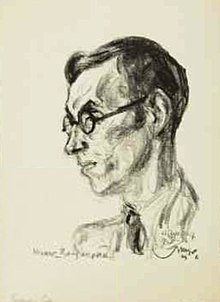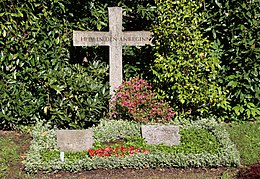Werner Bergengruen
Werner Bergengruen | |
|---|---|
 Werner Bergengruen | |
| Born | 16 September 1892 Riga,Livonia,Russian Empire (Now Latvia) |
| Died | 4 September 1964(aged 71) Baden-Baden,West Germany |
| Occupation | poet, novelist. |
| Nationality | German |
| Period | 20th century |
| Spouse | Charlotte Hensel |
Werner Bergengruen(September 16, 1892 – September 4, 1964) was aBaltic Germannovelistandpoet.He was nominated for theNobel Prize in Literature.[1]

Life and career
[edit]Bergengruen was born inRiga,Governorate of Livonia,which at that time belonged to theRussian Empire.After growing up inLübeckand attending theKatharineum,he started studyingtheologyinMarburgin 1911. He later changed to studyingGermanisticsandart history,but failed to graduate; he then moved toMunich.He served as a lieutenant duringWorld War Iand joined theBaltische Landeswehrin 1919 to fight against theBolsheviks.
On 4 October 1919, he married Charlotte Hensel (1896–1990), a great-granddaughter of the composerFanny Mendelssohn,and the daughter of the mathematicianKurt Hensel.From the marriage there were four children, Olaf, Luise, Maria and Alexander.
Bergengruen started writing novels and short stories in 1923 and decided to become a full-time writer in 1927. While his earlier works were of a more contemplative nature and pondered metaphysical and religious questions, theNazis'rise to power led him to write more political works. His most successful novel,Der Großtyrann und das Gericht(The Grand Tyrant and the Judgment), published in 1935, is set in theRenaissanceera, but the story of a merciless tyrant playing with the weaknesses of his underlings was often seen as a clear allegory on Germany's political situation. This interpretation is doubtful, though, as most of the novel was written before the Nazi takeover in 1933. In 1936 Bergengruen was received into theCatholic Church.The same year he moved to Munich; his new neighbour wasCarl Muth,editor of the Catholic monthlyHochland.In 1937 he was expelled from theReichsschrifttumskammerfor being unfit to contribute to German culture. Although Bergengruen was politically a staunch conservative, his Catholicism—as well as the fact that his wife was of partly Jewish heritage—contributed to his alienation from the Nazi regime.
In 1942, after his house in Munich was destroyed by bombs, Bergengruen moved toAchenkirch.AfterWorld War II,he lived in Switzerland,Rome,and finallyBaden-Baden,where he died in 1964.
Books
[edit]- "Rome remembered." (Transl. German: "Römisches Erinnerungsbuch" ) Introduced by Clare Boothe Luce. Translated by Roland Hill. 40 color plates by Erich Lessing; 57 engravings by G. B. Piranesi. New York: Herder and Herder, 1968 (ISBN978-022-397663-4).
- "A Matter of Conscience." New York: Thames & Hudson, 1952. Review:Books: Morality Whodunit, TIME May 12, 1952(ISBN978-086-922740-4).
References
[edit]- ^"Nomination Database".nobelprize.org.Retrieved2017-04-19.
- 1892 births
- 1964 deaths
- Writers from Riga
- People from Kreis Riga
- Baltic-German people
- German Roman Catholics
- Converts to Roman Catholicism from Lutheranism
- 20th-century German novelists
- German poets
- Mendelssohn family
- German Army personnel of World War I
- Baltische Landeswehr personnel
- Commanders Crosses of the Order of Merit of the Federal Republic of Germany
- Recipients of the Pour le Mérite (civil class)
- Schiller Memorial Prize winners
